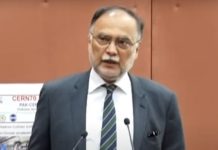Staff Report
ISLAMABAD: Minister for Planning, Development and Special Initiatives Professor Ahsan Iqbal on Thursday highlighted the importance of ‘retraining’ the youth for new skills, stressing the need for transforming the existing education imparting method into a skill-based system to produce quality manpower in line with the requirement of the contemporary world.
“The most important thing is how do we retrain our youth for new skills, and that means moving our education system away from the degree-based system and switching over to the skill-based system,” he said while addressing an event of “Dissemination of Pakistan Human Capital Review” here.
For this purpose, he said, the government had recently set up a national task force for human and skill development in which experts had been gathered from the public and private sectors.
“This task force will within one month give us a road-map that what new skills and changes in the human resource development programme are required to pursue so that we can keep our efforts aligned with the new emerging challenges,” he added.
The minister said the fundamental challenge for Pakistan was not new knowledge as “all the knowledge is known, I think the real challenge is implementation, implementation and implementation. We all need to have a sense of urgency and action, and now is the time that we cannot further delay ignoring our human resources because in this age, it is not the muscle power that can take any nation forward but the brain-power which truly needed to be harnessed.”
He said the federal government was working proactively in collaboration with all provinces for drastic improvement in the education sector, adding the in the upcoming budget “We are launching some major initiatives for bringing children into schools to ensure 100 per cent universal primary enrollment.”
He said the government wanted every student to have access to higher education under a multifaceted revolutionary system and “every student in our universities will have must a course of entrepreneurship and exports. There will be an orientation for them of job creation, not of job creation.
Ahsan Iqbal said human development was the key for any country to progress with the knowledge-based economy, for which he had been struggling for long to place Pakistan in the list of top five world economies by 2025.
He recalled that in 2013 when the Pakistan Muslim League-Nawaz (PML-N) government was in power, it faced multiple crises but effectively addressed the issues related to security, electricity, energy and inflation, adding had Pakistan continued on that trajectory, it would have achieved the required goals of national development.
“But once again, political changes overtook our ambition and efforts, and beyond 2018 and the Vision-2025 was scraped. Political changes do happen in counties but it should not mean a U-turn from all national programmes.”
In 2013, the minister said the country’s development budget was Rs 300 billion and increased to Rs 1000 billion by 2018, and unfortunately, when the incumbent government took over after the PTI’s four-year rule, the development budget had reduced to Rs 550 billion.
Now when the incumbent government was making a development budget for the next fiscal year, he said, there were demands of about Rs 1900 billion and “We have an envelope of Rs 727 billion only.”
“…This is the reality. If we have to focus on human resource development, we have to have resources, the economy has to grow and the required development budget has to be there,” the minister remarked.
Ahsan Iqbal said Pakistan suffered a lot from structural imbalance as if looked at its economic indicators “We fall close to middle-income countries in terms of our per capita income, but if you look at our social indicators, we fall in the category of the least developed countries. No country can have a sustainable development path if it has a fractured socio-economic platform . . . We have to have a balanced socio-economic platform if you want to have a stable growth path.”
To steer the country of the financial crisis and turn around Pakistan to a stable platform, he said the incumbent government was making concerted efforts to develop a framework based on five Es (Exports, E-Pakistan, Equity, Energy and Environment) which needed to be pursued vigorously.






